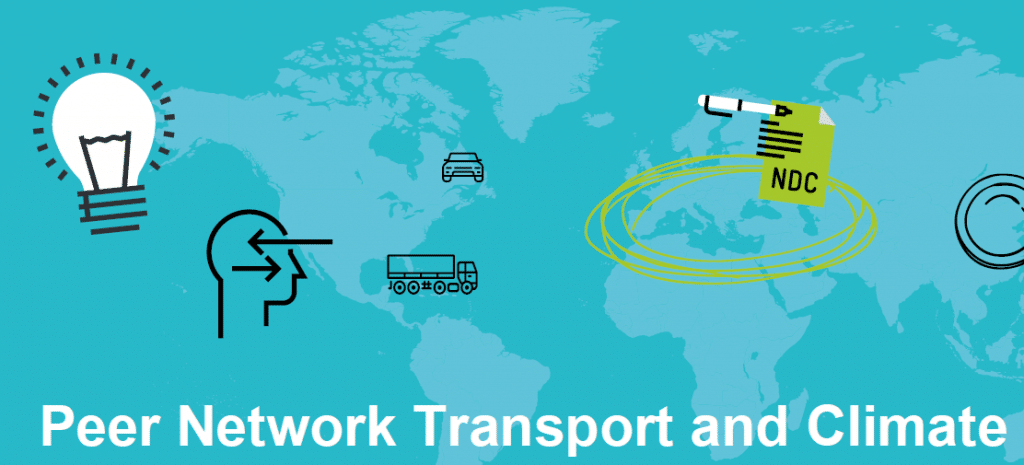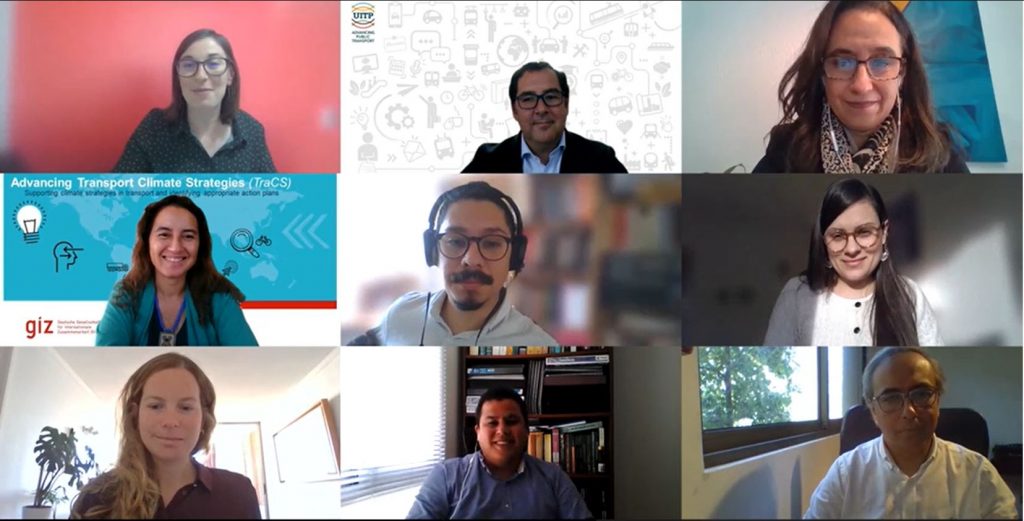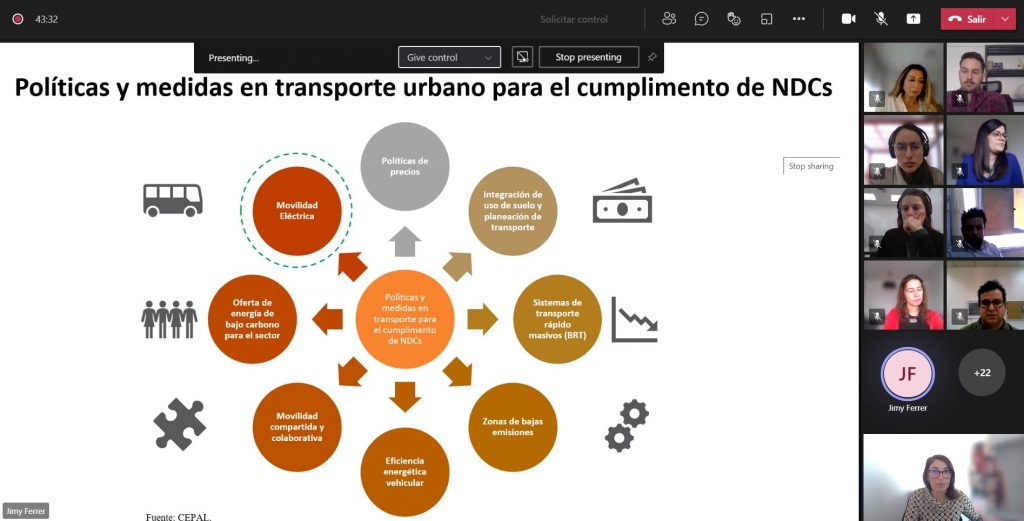
This article is part of our #StoriesofChange where we profile the work of our partner countries in developing climate actions in transport. Read more #StoriesOfChange and follow the Hashtag on Twitter.
With the objective to support national governments in Africa, Asia, and Latin America in transforming their transport sectors sustainably and, at the same time, responding to the challenges of climate change, the three BMU-financed GIZ projects Advancing Transport Climate Strategies (TraCS), NDC Transport Initiative for Asia (NDC-TIA) and Moving Chile have initiated three regional peer networks. The networks provide a space for officials from national transport and environment ministries of about 10 countries per region to meet, learn and exchange experiences on similar challenges, and to link and align transport and climate policy on the national level. Each of the networks is facilitated by a dedicated team of colleagues from GIZ and its implementation partner move2change.
In the first phase in 2021, the networks organise a series of six thematic exchange sessions that build on the policy briefing “Enhancing Climate Ambition in Transport – Six Action Recommendations for Policymakers to Align Transport with the Paris Agreement and the Sustainable Development Agenda.” Based on regional particularities, topics circle around climate targets for transport, electrification of transport, national urban mobility policies, freight systems, infrastructure investments, and adaptation to climate change.
The regional peers come together regularly in virtual sessions designed for sharing experiences through case studies and for discussing challenges and solutions in group work settings. Input presentations and contributions from guest speakers provide additional technical knowledge, insights into markets and global processes, and opportunities for technical and financial support.
To allow peers within Africa and Asia to connect and exchange beyond the sessions , the networks are using various communication tools and a dedicated shared space, where peers can access their colleagues’ professional profile, specific experience, and contact information.



Peer Network Africa paving the way for more collaboration
Linking transport, sustainable development and climate change is a challenge and opportunity at the same time, particularly for African countries that still need to develop their transport sector. With the current low per capita emissions of transport, governmental climate policies for the transport sector are still a recent development. The Peer Network Africa provides the basis for more exchange among peers, on the national and regional level, together with organisations of development cooperation. So far, peers from the network countries Côte d’Ivoire, Cameroon, Kenya, Zambia, Senegal, Tunisia, Uganda, Tanzania and Rwanda have come together in three sessions.
The sessions were supported by high-quality input from a diverse range of guest speakers such as the NAMA Facility (Radina Vassileva), UNEP (Alexander Körner), the MobiliseYourCity Partnership (Maeto Gomez), French CEREMA (Odile Ledésert) and the Ministry of Transportation and Telecommunication from Chile (Gisèle Labarthe). In addition, peers presented and dicsussed case studies from Tunisia, Rwanda, Uganda and Senegal.
Peer Network Asia further strengthens a long-standing engagement in the region
With fast growing transport emissions in Asia, the engagement of GIZ’s partner countries for decarbonising transport has increased continuously over the last decade. The Asian peer network builds on this long-standing engagement and also links closely with the activities of the NDC Transport Initiative for Asia. Asian network member countries include: Cambodia, India, Indonesia, Laos PDR, Malaysia, Nepal, the Philippines, Sri Lanka, Thailand, and Viet Nam. In the first two sessions, Indonesia, Sri Lanka and Viet Nam shared their experiences with peers through case studies and showcasing the application for a tool for identifying the most important stakeholders for certain mobility polices. In the third session on National Urban Mobility Policies and Programmes, Mr. Hadi Setiabudi (Ministry of Transport Indonesia) presented how to strengthen Urban Connectivity through the ‘Buy the Service Program’ and Ms. Sheilah Gaabucay-Napalang (Department of Transportation Philippines) introduced the Philippines’ National Urban Mobility Programme.
The sessions were supported by guest speakers from Agora Verkehrswende (Dr. Günter Hörmandinger), International Energy Agency (Ekta Bibra) and ICCT (Dr. Sandra Wappelhorst). The timing of the peer network’s launch fits well with the many updated and revised nationally determined contributions (NDCs) submitted by Asian countries, all leading up to the Environmentally Sustainable Transport (EST) Forum (18 Oct 2021 – 20 Oct 2021 Aichi, Japan), where a regional commitment for more sustainable transport is expected. Additionally, with the Council for Decarbonising Transport in Asia the peers will exchange on more potential measures with the experts in the beginning of 2022.
“I love joining this peer network !! it can really increase my knowledge”
Peer citation from session evaluation
Latin American series receives strong support from the Chilean Ministry of Transport and Telecommunications
The Latin American series has been hosted by the Chilean Ministry of Transport and Telecommunications as part of Chile´s ongoing UNFCCC COP Presidency and is supported by the Moving Chile project. The sessions held so far attracted participants from across the region and addressed the role of transport in UNFCCC long-term climate strategies, sustainable urban mobility planning, the recovery of public transport from the impacts of the Covid-19 pandemic as well as adaptation to the challenges of climate change and the relevance and challenges for the inclusion of electric busses in medium sizes cities. Participants from Argentina, Brasil, Chile, Colombia, Costa Rica, Dominican Republic, Ecuador, Paraguay, Peru, Mexico and Uruguay have been learning from each other, exchanging with thematic experts. Guest speakers from Finland, the United Kingdom and Spain shared their experiences. The remaining sessions will be hosted by the Ministry of Energy of Chile, and will likely focus on the development of e-taxis and sustainable freight transport.
Networks as a facilitator for accelerating transport’s transition



Raising ambition and accelerating action is crucial to achieving the climate objectives and sustainable development goals. Regional networks of officials working on transport and climate change will help governments to share information and experience in the years ahead, as work intensifies to deliver on Nationally Determined Contributions and UNFCCC commitments. These networks for exchange and knowledge transfer can play their role as facilitators and accelerators of actions. While the first phase of the networks will continue until early 2022, the ambition of the Peer Networks is to evolve into permanent spaces.
The first experiences and lessons learnt from the networks so far will be reported at UNFCCC COP26, as Chile hands over the COP Presidency to the United Kingdom. Stay tuned for updates communicated through the networks and the changing transport newsletter!
If you believe that you suffer (potential) negative social and/or environmental consequences from IKI projects, or wish to report the improper use of funds, to voice complaints and seek redress, you can do so using the IKI Independent Complaint Mechanism.
You are currently viewing a placeholder content from X. To access the actual content, click the button below. Please note that doing so will share data with third-party providers.
More Information